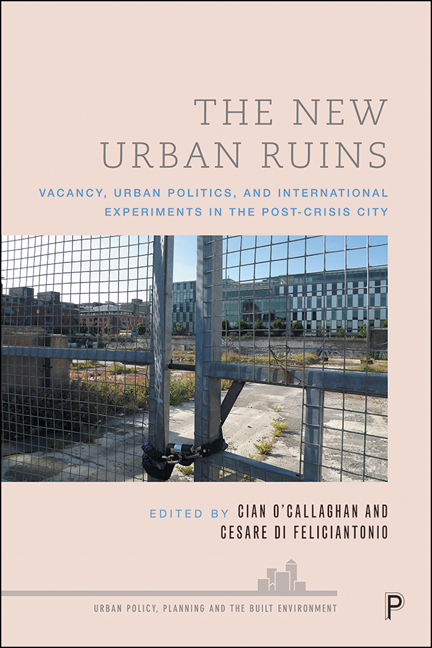Book contents
- Frontmatter
- Contents
- List of figures and tables
- Notes on contributors
- Acknowledgements
- Introduction
- PART I Rethinking ruination in the post-crisis context
- PART II The political economy of urban vacant space
- PART III Reappropriating urban vacant spaces
- Conclusion: Centring vacancy – towards a research agenda
- Index
Conclusion: Centring vacancy – towards a research agenda
Published online by Cambridge University Press: 13 May 2022
- Frontmatter
- Contents
- List of figures and tables
- Notes on contributors
- Acknowledgements
- Introduction
- PART I Rethinking ruination in the post-crisis context
- PART II The political economy of urban vacant space
- PART III Reappropriating urban vacant spaces
- Conclusion: Centring vacancy – towards a research agenda
- Index
Summary
Introduction
In the conclusion, we reflect on what we can learn from the chapters in this book about working critically and productively with ruins and urban vacancy as a lens to interrogate wider urban challenges. The genesis for this collection started with a workshop held at Trinity College Dublin in March 2017. While seeking to draw together a wide range of voices and approaches on the topic, our starting point was the ways in which the 2008 global financial crisis had made vacancy more visible and politicised across a range of different contexts. That crisis constituted a juncture that was expressed in the ‘new ruins’ that represented the collapse of a particular manifestation of financialised capitalism. ‘New ruins’ provided a concept to grapple with the political, economic and cultural fallout of the crisis, and to expand our theoretical lexicon. In the post-crisis period, vacant spaces presented a set of possibilities for dealing with the legacies of the previous era of growth and decline, becoming a vehicle to narrate the crisis (O’Callaghan et al, 2014), while also proposing alternative urban futures based on the commons (Bresnihan and Byrne, 2015). Since that time, a number of changes have occurred: the reassertion of neoliberal policy responses; the rolling out of new forms of financialisation; the increased pressure on urban real estate markets due to tourism and platform capitalism; the foreclosure and aggressive eviction of alternative projects/spaces; and the emergence of a regime to govern vacancy. While the possibilities presented by vacancy in the post-crisis juncture have been eroded, as a conceptual category and a site of policy, market and grass-roots intervention, urban vacant spaces remain significant.
As this book demonstrates, a growing body of work seeks to understand vacancy as being at the intersection of a range of emergent urban problems. If our political and conceptual understandings of the possibilities of vacancy in the post-crisis period were naive, unpacking more fully the dynamic role that vacancy plays in the city can provide a lens to address pressing questions. It is perhaps too early to assess what ways vacancy will present a challenge and an opportunity in the post-COVID-19 city.
- Type
- Chapter
- Information
- The New Urban RuinsVacancy, Urban Politics, and International Experiments in the Post-Crisis City, pp. 243 - 250Publisher: Bristol University PressPrint publication year: 2021



